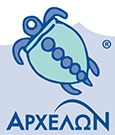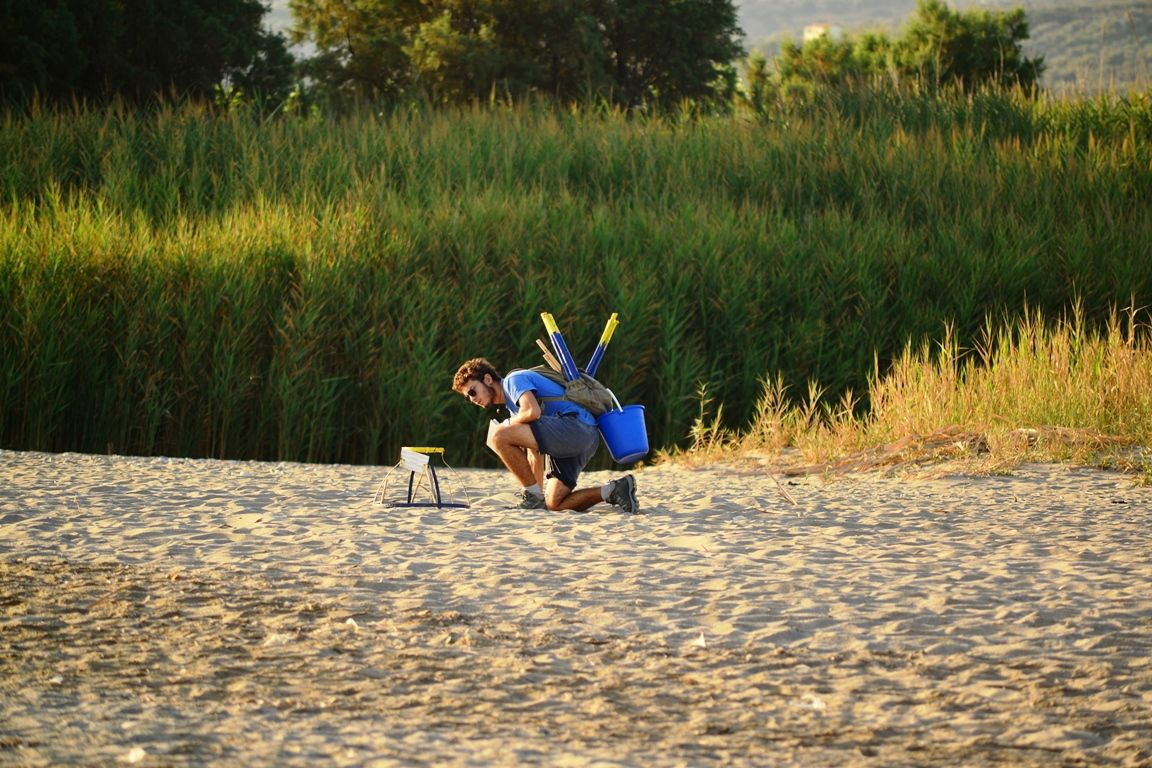Overview
The Rethymno area in northern Crete is the third largest nesting habitat of the loggerhead sea turtle (Caretta caretta) in Greece and the largest on the island. Rethymno is known for its beautiful beaches of golden sand and shallow waters. The beach extends for 12 kilometers.
Based on statistics which have been collected by ARCHELON volunteers since 1989, there is an average of 300 sea turtle nests per year on Rethymno beaches.
However, due to increased pressure from tourism-related development in Rethymno, a 45% decline in the number of nests (just over 200 nests per year) was recorded between 2000 and 2014. However, in recent years, this decline seems to have stabilized thanks to the conservation efforts implemented by ARCHELON for over 30 years.
Duties
From early May to the middle of October, volunteers of all ages and backgrounds from all over the world participate in ARCHELON’s sea turtle conservation program in Rethymno. The activities vary depending on the season (nesting season: mid-May through mid-August, hatching season: mid-July through late September) and include the following (attention, there may be modifications to the tasks depending on the needs of the project):
- ‘Patrolling’ the beaches every day (Morning observation- average duration time 5:00-12:00), during which loggerhead reproductive activity is recorded.
- Night ‘Patrolling’ (Night observation - average duration time 22:00 - 4:00), including measuring and tagging the nesting females.
- Protecting the nests in situ (with ‘fencing’) from both human activity and/or animal predation, and relocation of nests, when necessary.
- Constructing special ‘shading’ structures to guide hatchlings to the sea in areas where artificial light (from roads, shops, etc) may disorient the hatchlings when they emerge from the nest.
- Excavating nests after the hatchlings have emerged, in order to estimate the hatching success.
- Raising public awareness of both tourists and local residents by operating a seasonal information station in the old city of Rethymno, information tables and organizing presentations in hotels.
- Driving, maintaining equipment, maintaining the camp and its facilities (i.e. cleaning, etc.) and various jobs such as painting and carpentry. Artistic skills such as drawing and photography can also be quite useful.
- Following the protocol for dealing with injured or dead sea turtles, if necessary.
Free time
There are many free time activities to choose from: Visit the old city of Rethymno, swim or snorkel at the wonderful sandy beaches of the area (including the beach in front of our campsite), hike along the Crete section of the E4 European Long Distance path, explore the famous gorges and mountains of Crete (Agiofarago gorge, Samaria gorge, Asterousia mountains, White mountains, Psiloreitis, etc), visit the archaeological site of Archaia Eleftherna, visit the famous villages and beaches in the south or north of Rethymno (Margarites village, Plakias, Damnoni, Schinaria, Preveli, Agia Galini, Bali, etc).
Accommodation
Volunteers will live in the campground designated by ARCHELON for the duration of their participation in the Project. It takes about 45 minutes to walk from the campground to the centre of the old town of Rethymno. There is also a frequent local bus from the campground to the city of Rethymno; the trip takes about 20 minutes.
Accommodation costs are included in the Participation Fee. Volunteers must be prepared to take part in a communal life, and to live and work in both populated and secluded areas, often as members of small teams and usually under harsh conditions. Although relevant experience is not necessary, the ability to live and co-operate with people of different cultures and backgrounds is essential. Within the campground, there is an area that is used exclusively by the ARCHELON volunteers and contains all the equipment and facilities needed for daily life.
Facilities/Features of the campground:
- WC
- Solar-heated hot water showers
- Kitchen with basic equipment
- Wi-Fi
- A taverna (restaurant), which gives a discount on cooked meals and coffees to ARCHELON volunteers
- Washing facilities (paid service)
- Security: free individual or communal deposit boxes
- A very warm and friendly atmosphere. Inside the campsite, there is a specific area exclusively for ARCHELON volunteers, where there is all the equipment and necessary means for daily living.
While ARCHELON continually works to enhance the volunteers’ living conditions, the success of the camp ultimately relies on the commitment and dedication of each individual volunteer.
Dates, participation fee and other costs
Sea turtles come into the bay to nest in early May, together with the first tourists. The first team will be expected to kick off the project and the ARCHELON Field Station on the 8th of May. Monitoring, nest protection and public awareness activity will get busier every day up to mid-June.
From mid-June to about mid-August, everything escalates: final number of nests is reached, numbers of visitors on the beaches go up fast and reach their peak, and first hatchlings are out. Volunteer numbers need to be reinforced for this very busy period.
From mid-August to end of September hundreds of hatchlings reach to the sea with the help of volunteers and this an excellent time for public awareness and conservation work combined. The Field Station and the project are closed in mid-October.
Participation is arranged in full weeks, each to be calculated as 7 days from the date of taking up duties (e.g. if starting on a Tuesday, last day of duties will be Monday). The arrival date to the project site is the day before taking up duties. The departure day from the project site is one day after the last day of duties.
Participants in the project include full-time volunteers, both new and returning, as well as student interns and Greek-speaking volunteers.
Once approved, successful applicants will need to pay their volunteer participation fee depending on the dates of participation, as shown in the Overview Table.
Volunteer participation fees cover the cost of accommodation, administration, training and accident insurance coverage (up to a limit) as well as the annual subscription to ARCHELON.
The participation fee is paid once (in a single payment i.e. no partial payments are accepted) and proof of payment needs to be sent to ARCHELON before the volunteer status is confirmed.
Please note
- You will need to be in the project one day before your first day of participation and you can stay one day after the last day of participation in the project.
- The time of arrival needs to be sent by e-mail to the Volunteers Officer at least 5 working days before a volunteer arrives to take up duties.
- Each volunteer gets an exclusive ARCHELON “volunteer” T-shirt upon arrival.
- ARCHELON is not in a position to offer financial assistance. Volunteers are expected to cover their travel and personal costs along with their food expenses.
- Because of the communal lifestyle, volunteers usually share living expenses, estimated at around €25-€30 per week. Anyone who does not wish to participate in the communal arrangement can estimate their expenses at about €15 per day.
- For internships, the terms and conditions are outlined on the Internships and Research Opportunities webpage.
VOLUNTEER TESTIMONIALS
Pauline Rouffineau, France
My first mission was to find and protect the nests on the nesting beaches. At the same time, we had to keep the scientific data collected in the morning up to date. My second mission was to raise awareness among locals and tourists via an information kiosk in the city center and through presentations in the hotels located on the beaches of Pontes. Thank you to the entire team of ARCHELON of Rethymno in Crete for this superb human and enriching experience.
Louis Carson
To anyone with a month (or more) to spare, I highly recommend this experience. It can be intimidating at first, living and working closely with so many people. But the rewards far outweigh any initial nerves. Over time, I was consistently amazed by the diversity of ideas and the collective commitment to the cause and to the well-being of all at camp. And while a love for sea turtles isn’t a requirement to join ARCHELON, I guarantee you’ll love them before you leave!


